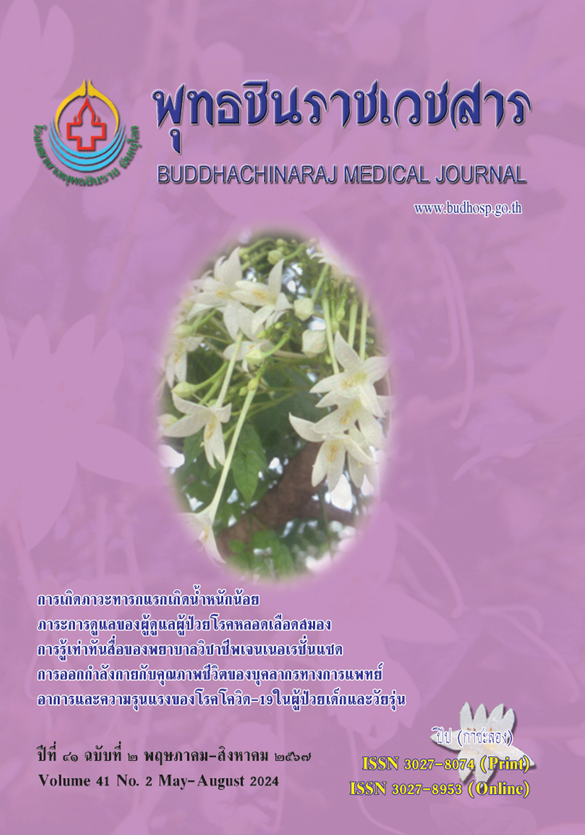ปัจจัยทำนายภาระการดูแลของผู้ดูแลผู้ป่วยโรคหลอดเลือดสมอง
ภาระการดูแลของผู้ดูแลผู้ป่วยโรคหลอดเลือดสมอง
คำสำคัญ:
ภาระการดูแล, ผู้ดูแลผู้ป่วยโรคหลอดเลือดสมอง, ปัจจัยทำนายบทคัดย่อ
โรคหลอดเลือดสมองเป็นการเจ็บป่วยที่การทำหน้าที่ต่างๆ เสื่อมลง ความสามารถในการช่วยเหลือตนเองลดลง ผู้ดูแลต้องใช้เวลาและพลังงานในการดูแลอย่างต่อเนื่อง เกิดผลกระทบต่อด้านร่างกาย จิตใจ การดำเนินชีวิตและสูญเสียรายได้ในครอบครัว เกิดภาระในการดูแล การวิจัยเชิงทำนายนี้มีวัตถุประสงค์เพื่อประเมินปัจจัยทำนายภาระการดูแลของผู้ดูแลผู้ป่วยโรคหลอดเลือดสมองประกอบด้วยเศรษฐกิจของผู้ดูแล ระยะเวลาในการดูแลต่อวัน ความสามารถในการปฏิบัติกิจวัตรประจำวันของผู้ป่วย และแรงสนับสนุนทางสังคม ศึกษาในผู้ดูแลผู้ป่วยโรคหลอดเลือดสมองที่รับการตรวจที่แผนกผู้ป่วยนอกในโรงพยาบาลระดับตติยภูมิแห่งหนึ่งในเขตภาคเหนือตอนล่าง 100 คน เครื่องมือที่ใช้ประกอบด้วยแบบคัดกรองอาสาสมัคร แบบบันทึกข้อมูลส่วนบุคคล แบบประเมินความสามารถในการปฏิบัติกิจวัตรประจำวันของผู้ป่วย แบบประเมินแรงสนับสนุนทางสังคม และแบบประเมินภาระในการดูแลของผู้ดูแลฯ นำเสนอข้อมูลด้วยค่าความถี่ ค่าร้อยละ ค่าเฉลี่ย และค่าเบี่ยงเบนมาตรฐาน วิเคราะห์ข้อมูลด้วยค่าสัมประสิทธิ์สหสัมพันธ์ของเพียร์สันและสถิติการถดถอยพหุคูณเพิ่มตัวแปรเป็นขั้นตอน ผลการศึกษาพบว่าภาระการดูแลของผู้ดูแลฯ อยู่ในระดับน้อย โดยความสามารถในการปฏิบัติกิจวัตรประจำวันของผู้ป่วย (β = -0.581, p < 0.001) และแรงสนับสนุนทางสังคม (β = -0.189, p = 0.019) มีความสัมพันธ์ทางลบกับภาระการดูแล ซึ่งมีความแปรปรวนร้อยละ 38.6 (adjusted R2 = 0.386, p < 0.001) ผลการศึกษาครั้งนี้สามารถใช้เป็นข้อมูลประกอบการวางแผนให้การพยาบาลโดยการพัฒนาความสามารถในการปฏิบัติกิจวัตรประจำวันของผู้ป่วยและการเพิ่มการสนับสนุนทางสังคมเพื่อลดหรือป้องกันภาระการดูแลของผู้ดูแลผู้ป่วยโรคหลอดเลือดสมองได้
เอกสารอ้างอิง
World Stroke Organization. Incidence and prevalence for all stroke types combined. Global Stroke Fact Sheet [Internet]. 2019 [cited 2024 Mar 25]. Available from: https://www.world-stroke.org/assets/downloads/WSO_Fact-sheet_15.01.2020
Ministry of Public Health. Campaign message for World Stroke Day. Division of Non-Communicable, Department of Disease Control [Internet]. [cited 2024 Mar 25]. Available from: http://thaincd.com/2016/mission/documents-detail
Poovatanaruk N, Nakawiro P. Prevalence and associated factors of caregiver burden among stroke patients. JPMAT [Internet]. 2020 [cited 2024 Mar 25]. Available from: https://he01.tci-thaijo.org/index.php/JPMAT/article/view/242188
Udonsart S, Jullamate P, Piphatvanitcha N. Male caregiver burden of elderly with stroke and its related factors. In the 3rd Nation Conference. Ubonratchathani: Ubonratchathani University; 2018. p.451-61.
Long N, Pinyopasakul W, Pongthavornkamol K, Panitrat R. Factors predicting the health status of caregivers of stroke survivors. A cross-sectional study. N Health Sci 2019;21(2):262-8.
Chayawatto C. Depression in the caregivers of stroke patients. Reg 4-5 Med J 2018;35(1):14-27.
Hanh PT. Factors related to caregiver burden among family caregivers of older adults with stroke in Hai Duong, Vietnam. SCNJ [Internet]. 2017 [cited 2024 Mar 25]. Available from: https://he01.tci-thaijo.org/index.php/scnet/article/view/102076/78995
Kunyodying T, Pothiban L, Khampolsiri T. Dependency of the elderly with stroke, caregiver burden, social support, and quality of life among older caregivers. Nursing J 2015;42(Special December 2015):107–17.
Ogunlana MO, Dada OO, Oyewo OS, Odole AC, Ogunsan MO. Quality of life and burden of informal caregivers of stroke survivors. HKPJ 2014;32(1):6-12.
Kongnirundon S. Factors influencing burden among caregivers of patients with schizophrenia. The JPNMH 2018;32(3):118-32.
Srisathitnarakun B. The methodology in nursing research. Bangkok, Thailand: U & I Inter media Co Ltd; 2007.
Thai Neurological Nurse Society, Clinical Nursing Practice Guideline for Stroke [Internet]. Neurological Institute of Thailand 2007 [cited 2024 Mar 25]. Available from: http://www.neurothai.org/images/2012/download/stroke-nurse2007.pdf
Chuaoupathum R. Nursing care need of caregivers for stroke patients at home [Internet]. Christian University; 2010 [cited 2023 Jun 15]. Available from: http://library.christian.ac.th/thesis/document/T030715.pdf
Zarit SH, Reever KE, Peterson JB. Relatives of the impaired elderly: Correlates of feelings of burden. Gerontologist 1980;20(6):649-55.
Junsiri P. Caregiver burden among caregivers of stroke patient in intermediate care service of Kosumpisai hospital. Mahasarakham Hosp J 2021;18(2):72–80.
Akosile CO, Banjo TO, Okoye EC, Ibikunle PO, Odole AC. Informal caregiving burden and perceived social support in an acute stroke care facility. HQLO 2018;16(1):1-7.
Choi K, Kim H, Kwon S, Kim J. Factors affecting the burden on caregivers of stroke survivors in South Korea. Arch Phys M Rehabil 2005;86(5):1043-8.
Pongsuwan C. Qualitative study on how caregivers of stroke patients in southern Thailand manage their own self-care and the care for their family in the long-term. SCNJ 2022;9(1):213-27.
Kongnirundon S. Factors influencing burden among caregiver of patients with schizophrenia. JPMHN 2018;32(3):118-32.
Inphen Y, Chaiard J, Khampolsiri T. The effect of social support program on adaptation of stroke caregivers. Nurs J 2021;48(1):41–53.
Wijitraphan T. Prevalence and risk factors of caregiver burnout in stroke patient’s caregiver. Lanna J Health Promotion Environmental Health 2020;6(1):56–62.
ดาวน์โหลด
เผยแพร่แล้ว
ฉบับ
ประเภทบทความ
สัญญาอนุญาต
ลิขสิทธิ์ (c) 2024 ``โรงพยาบาลพุทธชินราช พิษณุโลก

อนุญาตภายใต้เงื่อนไข Creative Commons Attribution-NonCommercial-NoDerivatives 4.0 International License.






